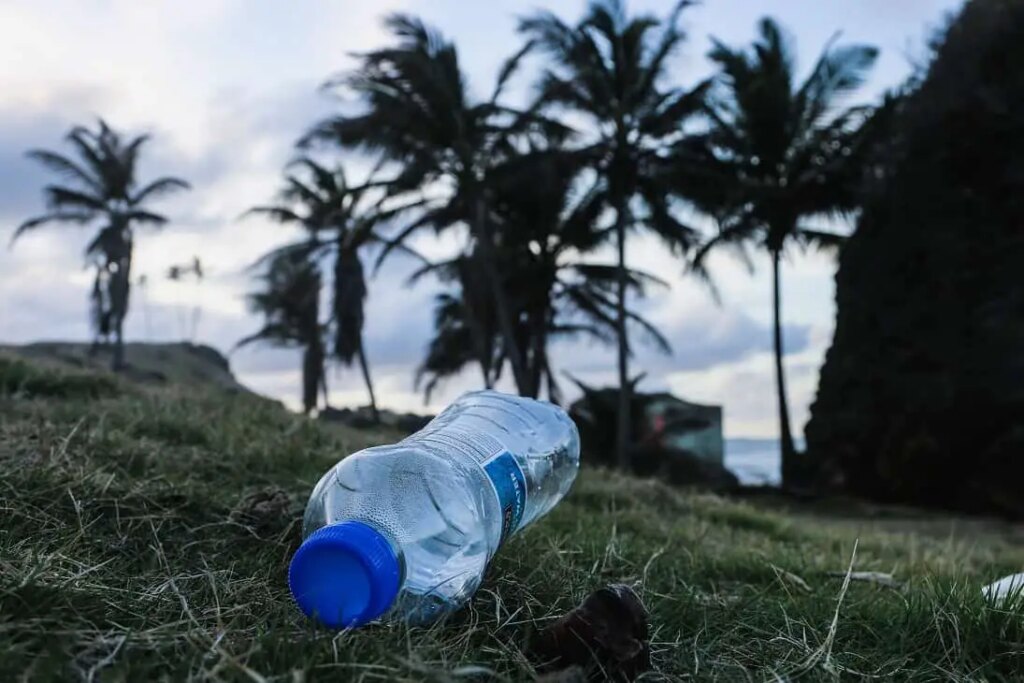34 Ways To Use Less Plastic In Daily Life: [Only Best Tips]

If you are trying to find some tips and ways to use less plastic in your everyday life, then you will find it Love This article.
Look at them as food for thought and try to apply more of them gradually.
34 Best Ways To Use Less Plastic In Everyday Life:
1. Reduce and Recycle!
Reduce use, reuse and recycling are the best ways to keep anything out of our environment.
2. Avoid, if possible, the worst kind of plastic!
When shopping, pay close attention to labels or manufacturer information. Try to keep away from polyvinyl chloride (PVC), polystyrene (PS), and polycarbonate (PC).
PVC is generally only half plastic.
The other half are additives such as softeners, dyes and fillers, many of which are highly toxic. They cause a wide range of health and environmental problems.
PS contains styrene.
It is inhaled and stored primarily in the liver, kidney, brain and adipose tissue.
It is irritating to the respiratory system, skin, eyes and mucous membranes. Inhaling or swallowing may produce symptoms such as lack of concentration, fatigue, nausea, dizziness and headaches.
PC contains bisphenol A.
According to research by the Federal Environment Agency, new studies show a link between diabetes, cardiovascular problems, lack of libido or even obesity and increased levels of BPA in the blood.
3. Learn about the oceans and marine life.
All life on earth is connected to the sea and its inhabitants.
The more you find out about the problems facing these vital organisms, the more you and your own will want to help secure the survival of our marine ecosystems.
And then share this knowledge with family, friends or co-workers. It is about informing, inspiring and educating others.
Even if many do not want to hear the bad news or make fun of it (“green poop left”), stand firm and calmly explain once more how plastic waste has really accelerated the destruction of already damaged coral banks.
And why is that the one thing that concerns each of us, if we do not want to pass on a dying planet to our kids.
4. Avoid plastic bags!
Humanity produces a huge mountain of a few trillion plastic bags a year. Every additional minute adds another 2 million bags to this incredible amount!
Even we Germans who are supposedly very environmentally conscious aren’t so innocent, we use over 100 pieces per capita.
They are the world’s most ubiquitous consumer goods, but only 1 percent of all plastic bags produced worldwide are recycled.
Even when we try to get rid of these troublemakers, we burn them in incinerators and thereby poison the air.
We store it on the ground in landfills, where it releases its toxic chemicals into the soil, undisturbed, for hundreds of years to come.
We throw it overboard where it kills our fish and corals. stop it!
Use reusable bags, baskets or backpacks produced from hemp, paper, cotton or other natural fibres. It’s a good idea to put a spare bag in your shopping bag or laptop bag and in the trunk of your car.
Use all bags, be they (cotton), plastic, or paper bags as often as possible!
Don’t be fooled: A bag or container produced from “bioplastic” today is still purely a display case – particularly if it has “compost” on it.
In the least number of cases, such bags are literally biodegradable and when they’re, only under very specific conditions in industrial composting.
Please report this misdirection to the vendor!
5. No more single-use plastics (straws, coffee-to-go, ..)
The smartest thing, obviously, is to no longer use single-use plastic.
Straws, bottles and caps, food containers and coffee or tea cups made of plastic are the biggest environmental polluters besides plastic bags.
Eight out of ten of the most common items in the plastic waste choking our oceans are single-use packaging.
Straws may appear to be a trifle, and there are literally no figures for their use in Germany and Europe, but the US population alone consumes 500 million units every day.
For this reason, sales bans have been issued in many states.
6. Do you pay attention to the clothes you wear?
The largest proportion of microplastics in the sea comes from synthetic textiles at 35 percent.
When clothes made of polyester, acrylic, lycra (spandex), or nylon are washed, between 600,000 and 18 million microfibres dissolve with each wash and end up in wastewater.
Because they’re so small, water purification filters cannot catch microplastic particles. This is how particles enter our food chain.
Choose clothes produced from wool or cotton, hemp and other natural fibres.
Buy products marked with the GOTS (Global Organic Textile Standard) label and similar quality seal.
Stay away from viscose, nylon, spandex, and polyester.
Broken pieces?
Learn how to handle needle and thread, as often a hole in a sock or jacket can be patched or re-stitched.
How about body care?
7. Choose toilet paper that’s not wrapped in plastic.
Find a supplier of recycled paper or bamboo.
The better part: your purchase will be delivered in a box without plastic packaging.
Many of these responsible companies spend part of their profits on the construction of toilets and sanitation amenities in developing countries.
A really good alternative is – make it yourself.
You can avoid plastic packaging, know precisely what’s in your homemade product (no microplastics), and make a fun event out of the manufacturing process.
On the last page of this book you’ll find some home recipes, so you can get started right away.
Many more can be found on the internet.
8. No more cheap razors!
Instead of throwing your plastic razors in the trash every month, you should consider switching to razors where you only need to replace the blades.
For men: Use an electrical razor.
Also, wearing a beard is totally socially acceptable.
9. Use plastic-free cosmetic products!
The concept of moisturizing with plastic every day? Not a really good thought.
Maybe you have been doing that for a while now.
(micro)plastics are in additional products than you might think, according to a study by the BUND. But there are cosmetic products that you can use without hesitation.
You can find this stuff at most well-stocked organic markets and drugstores. This manufacturer offers a broad range of plastic-free cosmetics.
Or make your own eco-friendly and microplastic-free cosmetic products.
10. It is best to do eco-friendly shopping using returnable containers and your own shopping bags made of sturdy and powerful materials.
Try burlap. Buy in bulk every time possible.
11. Don’t buy mineral water in plastic bottles!
Mineral water in PET bottles is not only available in plastic bottles, but also enormous resources are spent on extraction, bottling and shipping.
In most cases, bottled water is just filtered tap water.
So get a reusable stainless steel bottle or stainless steel travel cup and fill it with tap water before you leave the house.
It is highly recommended not to use reusable PET or aluminum plastic bottles.
After a while, plastic can release chemicals (softeners) into the water and aluminum bottles are coated with harmful epoxy resin.
If you prefer sparkling water, I can recommend Sodastreamer.
In no time, you are making incredible bubbly water out of tap water without hauling crates.
12. Farmers markets and market days are an incredible way to buy fresh local produce without the plastic packaging.
Remember to bring your own bag.
Usually, vegetables and fruits in produce markets do not even have these little plastic stickers.
Most retailers are also happy for you to bring back these little straw baskets of berries and mushrooms for your next purchase.
13. Milk must be in bottles, not plastic.
In all federal states, there are local dairies that ship milk in returnable glass bottles rather than plastic or plastic-coated cartons.
Many health food and organic farm stores encourage you to return the empty bottle for the next full bottle in exchange for a discount.
Win-win!
14. Fresh breath through plastic? Avoid chewing gum!
Historically, chewing gum has been used as a medication rather than a treatment, as a result of its basic ingredients derived from natural tree resins and aromas from natural herbs and spices.
Today, that’s another story as many popular brands of gum are crammed with plastics, synthetic gum, and artificial sweeteners.
15. Buy laundry detergent refills or even better: make your own!
Many everyday items such as detergents and softeners, cleaning products, soaps and more are available in refill packs.
They cause less plastic waste than having to buy a whole new pack or bottle every time.
Or: it is best to make everything yourself. You will find tips for this at the end of this book.
16. Unpackaged sausage and cheese
It is also possible to buy plastic-free at the meat and cheese counter!
While supermarkets and butchers are required to conform with EU hygiene regulations, so long as your own container is not behind the counter, you can purchase without any foil.
17. Get used plastic items that are really needed.
Yellow Pages, thrift stores, eBay and Craigslist offer nearly anything your heart desires. The advantages are apparent:
- Used products don’t require new resources or energy for their production.
- These items don’t require landfills, don’t need to be burned and don’t pollute our environment.
- Buying used equipment generally means buying locally (1), which also reduces greenhouse gas emissions.
- Buying used is largely a fair trade.
- If you bought a used plastic product, softeners such as softeners, paints, and adhesives may have released all of their volatile organic compounds to the previous owner.
18. We recommend using organic shipping services for shipping and ordering goods.
They ship their products unpacked in reusable boxes right to your front door. That’s not it either: a sweeping week.
19. Take off to your vacation by plane – Plastic Free!
Plastic cups, plastic bowls, plastic lids – all the endless trash.
Airlines are reluctant to speak about the amount of waste that comes from travel. But you as a passenger can do a lot to lighten the environment.
Empty bottles, jugs, or glasses can be easily retrieved through the security gate.
And homemade rolls from the bread box taste way better than the standard airline cardboard sandwiches in their plastic wrap.
Ask cabin crew: Can you refill my plastic cup? Do you have glasses? Can I separate my trash here? What happened to him in the end?
Write to the airline if the answer doesn’t satisfy you!
Why are so many single-use plastics getting used? What programs do you have for waste prevention? Do you actually need a toiletry bag crammed with disposable products on a night flight?
If so, at least use it a few times.
The same goes for disposable headphones: they normally end up in a landfill or incinerator after a flight – even although they really end up in e-waste.
Take your trash with you: The airlines themselves hardly ever recycle.
However, many airports offer reasonable waste segregation systems.
20. Clean your home with natural ingredients
Soda, sodium bicarbonate, vinegar, citric acid, and curd soap can replace nearly any drugstore product.
They come without unnecessary chemicals and replace the plastic bottles used for toilet cleaners, detergents, and glass cleaners.
21. Wash your dishes with natural dishwashing detergent
Use baking soda or soap for your dishes.
Lemon juice or orange zest are perfect for cleaning stainless steel sinks or sinks.
With them you can wash dishes in addition to other conventional industrial products and leave a squeaky clean kitchen. Absolutely without plastic and chemicals.
For items that are very hard, burnt, or spilled, we recommend using steel wool bales that came in a plastic-free box.
22. Avoid non-stick cookware!
Have you ever heard of polymer fever?
Cookware coated with Teflon or other resins will release the toxic chemical perfluoro if heated too high.
In particular, improper handling of Teflon-coated products such as cookware, ovens or irons creates the likelihood of poisoning.
23. Use natural wipes and scourers rather than plastic dusters and artificial sponges
There are cleaning supplies such as cleaning rags, dishwashing brushes and sponges made of natural fibers.
Best of all: Natural sponges are often sold without plastic packaging because they do not need to be kept moist; they only expand when wet!
Or do you prefer to crochet your sponge yourself?
24. Avoid disposable paper towels
Use a natural fiber brush to clean glass and scrub dirty dishes.
Organic cellulose and cotton kitchen towels clean like a rag, absorb moisture like a sponge and can replace more than 15 rolls of disposable paper towels.
Of course, a good old rag produced from old clothes and towels are free and possibly the most eco-friendly option.
25. Clean tiles and windows naturally
It does not all the time must be a chemical mace from a plastic bottle.
The hot vinegar, citric acid and black tea bring the tiles and windows back to their shine.
Instead of using an artificial cloth or sponge, use old newspapers or old tights dipped in water.
26. Buy cat toys, scratching posts, or furniture produced from natural materials, not plastic
There are beautiful natural toys made of wool, feathers, and catnip, cardboard boxes are an incredible pastime and no cat says no to a scratching tree made of real wood.
27. Get rid of the plastic food bowls for cats
They have long been suspected of being one explanation for so-called “chin pimples”, which mainly affect cats.
Plastic is a magnet for bacteria and dirt that eats away at scratches and notches.
Your pet may be infected and/or transmit the bacteria to other roommates in the house, including humans.
Veterinarians usually recommend using only glass or metal food bowls and cleaning them daily.
28. Use rechargeable batteries instead of normal batteries!
Use rechargeable power storage options to cut down on buying plastic-wrapped batteries.
However, neither rechargeable nor ordinary batteries are a conservation standard.
However, rechargeable batteries beat regular batteries in terms of environmental friendliness as they can be recharged around 1000 times.
29. Dispose of old electronics responsibly!
Most of the plastic waste, particularly in African and Asian countries, comes from used televisions, computer monitors, keyboards, cellphones and other technical devices.
It has been known for many years that Germany exports at least 155,000 tonnes of old electrical equipment per year to Africa and Asia.
Also, the pollutants contained in it poison people and the environment there.
You do not need the newest iPhone if your “older” iPhone still works fine.
If something is broken, first try to fix the damage.
A tech-savvy young mechanic, specializing in such operations on smartphones or open computers, is quite appropriate.
Take electronic devices that are beyond repair to an e-waste collection center so they can be disposed of and recycled properly.
No one wants to trip over an old computer monitor in the woods.
Therefore, even though it is occasionally inconvenient: separate the plastic from other materials in the waste, so that recyclable materials can be recycled (2).
No other country in the European Union consumes as much plastic as Germany. What’s more important is that it can be used and reused multiple times.
30. Become a navy sponsor!
As you have seen, all species and habitats in the oceans, but also in the North and Baltic Seas, are threatened by humans.
Fishing, mining, shipping, and growing amounts of plastic waste have pushed the oceans to their limits, and often beyond.
Even in their protected areas the marine inhabitants aren’t safe from us. This is the right time to act!
Together with other volunteers, make sure that animals and habitats in the North and Baltic Seas have a future.
31. Don’t buy souvenirs using our marine life for profit.
Many souvenirs from your vacation in the south contributed to the destruction of sensitive coral reefs and marine populations.
Avoid buying items such as coral jewellery, tortoiseshell accessories (from loggerhead turtles) and shark tooth chains.
32. Commit to fighting trash!
You live on the coast?
Then it is quite easy to help remove plastic waste from the ocean or stop plastic waste from getting there.
Participate in a local beach or riverbank cleanup.
This is probably the most direct and beneficial ways to fight ocean pollution by plastic. Just go for a walk on the beach or along the river and collect plastic waste by yourself, with friends or family.
Join a group of cleaning maniacs on Facebook, water conservationists or MeetUp.
They haven’t got it at your place? Then set yourself up!
Especially on vacation, when the sun is shining? And trash piled up on the beach? Why not join thousands of other volunteers for the annual International Coastal Cleanup Day?
33. Put pressure on the main culprits of the plastic flood and praise those who reduce their use of plastic!
Currently, more than 320 million tons of plastic are produced yearly, with a robust upward trend.
The main customer is the packaging industry, which mainly uses it for product marketing.
The content does not get any better with this.
In many German cities, there are now “unpackaged” shops, where customers can stock up on food, cosmetics, etc. into the containers they brought with them.
Rethinking can even influence who appeals to food manufacturers and retailers as alternatives – or simply ordering regional produce, for example, in fruit and vegetable boxes.
Companies that sell or offer products in plastic containers must have a trash bin onsite where customers can eliminate the plastic, and they must make sure that the plastic is collected by local authorities or a pick-up company.
If a company or manufacturer uses too much plastic packaging, let them know. Just call, write an e-mail or tweet.
Most companies are represented on social media or have contact information on their website.
If there is no answer, kindly post your thoughts on Facebook, Reddit, or Instagram. Instead, often praise companies that reduce their use of plastic.
34. Become a political activist!
Environmental movements like Greenpeace, nature conservation groups like NABU or BUND, but also house associations are the most efficient ways to get politicians to act and alter consumer behavior on a large scale.
It is up to each of us to do our part to protect the Earth.
Only far-reaching laws and regulations to protect our nature from the harms of plastic can save our planet from an apocalypse where we literally stand ankle-deep in plastic straws and cups.
I want to thank you for taking the time to read my article about tips and ways to reduce plastic use in everyday life. I actually hope that its content has been of good help to you.







